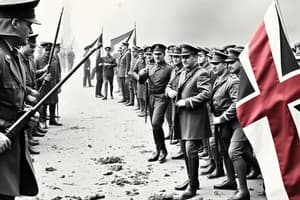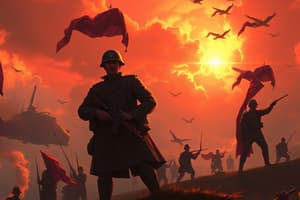Podcast
Questions and Answers
What term is used to describe the heavy investment in armed forces and military posturing before World War I?
What term is used to describe the heavy investment in armed forces and military posturing before World War I?
- Diplomacy
- Nationalism
- Alliance Systems
- Militarism (correct)
Which countries were part of the Triple Entente alliance system before World War I?
Which countries were part of the Triple Entente alliance system before World War I?
- France, Britain, Russia (correct)
- Germany, Austria-Hungary, Italy
- Britain, Italy, France
- Russia, Austria-Hungary, Germany
What major contributor to the outbreak of World War I focused on the belief in military strength over diplomacy?
What major contributor to the outbreak of World War I focused on the belief in military strength over diplomacy?
- Nationalism
- Militarism (correct)
- Assassination of Archduke Franz Ferdinand
- Alliance Systems
Which event is considered the fateful trigger that led to the outbreak of World War I?
Which event is considered the fateful trigger that led to the outbreak of World War I?
Which group of countries made up the Central Powers in the lead-up to World War I?
Which group of countries made up the Central Powers in the lead-up to World War I?
What concept refers to the idea that a nation's strength lies in its military might rather than diplomatic efforts?
What concept refers to the idea that a nation's strength lies in its military might rather than diplomatic efforts?
What factor transformed localized disputes into far-reaching global conflicts?
What factor transformed localized disputes into far-reaching global conflicts?
Which sentiment swept across Europe in the late 19th and early 20th centuries, leading to expansionist policies?
Which sentiment swept across Europe in the late 19th and early 20th centuries, leading to expansionist policies?
What event ignited a combustible mixture of factors, leading to a worldwide catastrophe?
What event ignited a combustible mixture of factors, leading to a worldwide catastrophe?
Which factor led many nations to aim for expansion by uniting culturally related groups under their rule?
Which factor led many nations to aim for expansion by uniting culturally related groups under their rule?
How did the assassination of Archduke Franz Ferdinand contribute to the outbreak of World War I?
How did the assassination of Archduke Franz Ferdinand contribute to the outbreak of World War I?
Which aspect of the conflict involving powerful players pulled multiple countries into war due to established pacts?
Which aspect of the conflict involving powerful players pulled multiple countries into war due to established pacts?
Flashcards are hidden until you start studying
Study Notes
Origins of World War I: A Tale of Conflict's Roots
The Great War, now known as World War I, was one of history’s most devastating conflicts. To understand how this global conflagration erupted from its peaceful beginnings, we must examine several interconnected factors at play during the early twentieth century. In this exploration, we will delve into four primary contributors—militarism, alliance systems, nationalism, and the fateful event of the assassination of Archduke Franz Ferdinand.
Militarism: Preparing For Conflict
Throughout Europe, military spending and posturing rose dramatically before WWI. This is commonly referred to as 'militarism.' Governments began to heavily invest in their armed forces, building up arsenals and increasing troop sizes. These decisions were spurred by fears over potential threats—both real and imagined—from rival nations. The belief that strength lay solely in military prowess, rather than diplomacy, only intensified these preparations.
Alliance Systems: Chain Reaction of Conflicts
A tangled web of treaties formed the complex system of European alliances leading up to World War I. Each nation sought security through agreements with others, forming two major blocs—the Triple Entente consisting of Russia, France, and Britain; and the Central Powers comprising Germany, Austria-Hungary, and Italy. As tensions escalated, it became apparent that a conflict involving even one of the powerful players would pull multiple countries into war due to these pacts. This factor effectively transformed localized disputes into far-reaching global conflicts.
Nationalism: Celebration Turned Into Contention
Nationalistic sentiment swept across Europe in the late nineteenth and early twentieth centuries. Enormous pride associated with ethnicity led many nations to seek expansionist policies designed to unite culturally related groups under their rule. One example of such nationalism fueling conflict can be seen in Balkan states like Serbia, which aimed to create a Greater Serbian state encompassing areas inhabited by Slavic peoples within the Austro-Hungarian Empire.
Assassination Of Archduke Franz Ferdinand: Spark Ignites Combustible Mixture
On June 28th, 1914, Archduke Franz Ferdinand, heir to the throne of Austria-Hungary, along with his wife Sophie Chotek, were tragically gunned down in Sarajevo by Gavrilo Princip, a member of a Serbian nationalist group called Black Hand. While the archduke's death itself may seem relatively insignificant considering the vast scale of events that followed, its consequences fed off the tense conditions created by militarism, alliance networks, and nationalism. Austria-Hungary declared war against Serbia, thus setting off a chain reaction throughout the continent. Initially viewed as merely localized aggression between two neighboring countries, the assassination ultimately led to a worldwide catastrophe.
In conclusion, the precursors to World War I resulted largely from the convergence of various factors—militarism, alliance systems, nationalism, and the assassination of Archduke Franz Ferdinand. These elements combined to produce a climate ripe for war, allowing seemingly minor incidents to spark a conflagration of epic proportions.
Studying That Suits You
Use AI to generate personalized quizzes and flashcards to suit your learning preferences.




